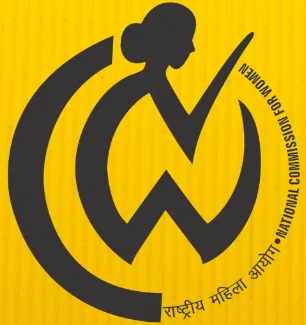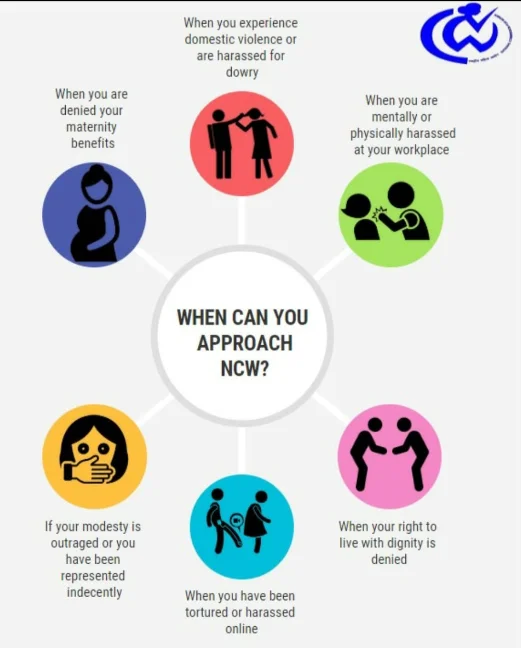The National Commission for Women (NCW) was established on January 31, 1992, under the National Commission for Women Act of 1990. It is dedicated to safeguarding women’s rights and welfare by reviewing constitutional and legal protections for women, recommending legislative measures, addressing grievances, and advising the government on policies affecting women. The NCW has been instrumental in addressing issues such as child marriage, legal awareness, and reviewing key legislations like the Dowry Prohibition Act and the Indian Penal Code.
Enroll now for UPSC Online Course
National Commission for Women: Championing Women’s Rights and Welfare
Establishment and Role of the National Commission for Women
- Establishment: The National Commission for Women was established as a statutory body on 31 January 1992, under the National Commission for Women Act of 1990, dedicated to women’s rights and welfare with a view to:
- Review the Constitutional and Legal safeguards for women
- Recommend remedial legislative measures
- Facilitate redressal of grievances
- Advise the Government on all policy matters affecting women

- Legislative Reforms and Legal Initiatives: The Commission effectively addressed the issue of child marriage, sponsored legal awareness programs, and meticulously reviewed and amended key legislations, including the following:
- Dowry Prohibition Act of 1961
- Pre-Conception and Pre-Natal Diagnostic Techniques (PCPNDT) Act, 1994
- Indian Penal Code of 1860
- National Commission for Women Act of 1990
- Awareness Programs and Societal Initiatives: The Commission also conducts workshops, establishes expert committees focusing on women’s economic empowerment, organizes seminars on gender awareness, and launches campaigns against societal issues such as female foeticide and violence against women, all aimed at generating awareness and combating these social evils in society.
Structure of the Commission
- According to Section 3 of the National Commission for Women Act 1990, the Commission is constituted by the Central Government and includes a Chairperson, 5 Members, and a Member-Secretary.
| Composition | Eligibility |
| Chairperson |
|
| Five Members |
|
| Member – Secretary |
|
Term
- The Chairperson and every Member are appointed for a period of three years in office.
Removal
- Authority of the Central Government in Removing NCW Members: The Central Government has the power to remove a member of the NCW, including the Chairperson, under the following circumstances:
- Resignation: A member of the NCW may resign from their office by writing to the Central Government.
- Death: If a member of the NCW dies, they will be deemed to have vacated their office.
- Grounds for Removal of a Member of the National Commission for Women
- Incapacity Due to Infirmity: If the Member has become incapable of discharging the functions of the office due to infirmity of mind or body.
- Conviction for Moral Turpitude: If the Member has been convicted of an offense involving moral turpitude.
- Undischarged Insolvency: If the individual becomes an undischarged insolvent.
- Absence from Meetings: If the Member has been absent from three consecutive meetings of the NCW without any reasonable cause.
- Abuse of Position: If the Member has, in the opinion of the Central Government, so abused the position of Member as to render that person’s continuance in office detrimental to the public interest.
Functions of the National Commission for Women
- Research and Study: Conduct research and studies on issues relevant to women’s rights and gender equality.
- Gather data and information to support evidence-based policy recommendations.
- Advocacy and Awareness: Engage in advocacy efforts to raise awareness about women’s rights, gender equality, and related issues.
- Organise campaigns and events to promote social awareness and change attitudes towards women.

- Legal Aid and Support: Provide legal aid and support to women who have faced discrimination, violence, or other rights violations.
- Assist women in accessing justice and navigating legal processes.
- Training and Capacity Building: Offer training programs and capacity-building initiatives to various stakeholders, including law enforcement agencies, to sensitize them towards women’s issues and improve their response to gender-based challenges.
- Policy Recommendations: Based on their research and findings, make policy recommendations to the government to address systemic gender disparities and create a more gender-inclusive society.
- Collaboration and Partnerships: Collaborate with various stakeholders, including NGOs, civil society organizations, and other government bodies, to create a collective effort to promote women’s rights and gender equality.
- Inquiry and Investigation: Investigate and examine all matters relating to the safeguards provided for women under the Constitution and other laws.
- Action Research: Propose measures to encourage women’s representation in all spheres and review their advancement.
- Legal Intervention: The Parivarik Mahila Lok Adalat (PMLA) is an innovative component with its roots in the traditional Nyaya Panchayats.
- It was created by NCW for the redressal and speedy disposal of cases.
Power of the National Commission for Women
- Civil Court Authority: The National Commission of Women (NCW) has the same powers as a civil court.
- Summoning and Attendance Enforcement: It can summon and enforce the attendance of anyone from anywhere in India.
- Document Discovery and Production: It can require the discovery and production of any document.
- Document Disclosure and Affidavits: The NCW ensures that all documents are properly disclosed and produced as evidence in the form of affidavits.
- Request for Public Records: It can request copies of public records from any court or government office.
- Examination of Witnesses and Documents: It can examine witnesses and documents and issue commissions for this purpose.
- Consideration of Referred Matters: The NCW can also consider matters referred to it by the commission or the government.
- Oath Examination: It has the authority to summon and examine any person from any part of India on oath.
Working of the National Commission for Women
- The Commission processes complaints received verbally or in writing and can also initiate investigations into cases related to women on its initiative (suo-moto).
- The commission receives a variety of complaints about crimes against women, which are categorized as follows:
- Domestic Violence: This includes physical, sexual, emotional, and economic abuse.
- Sexual Violence: This includes rape, sexual assault, and harassment.
- Trafficking: This involves the recruitment, transportation, and exploitation of people for the purposes of forced labor, sexual exploitation, or commercial sexual exploitation.
- Dowry Harassment: This is a form of domestic violence that is specific to India, and it involves the demanding or accepting of dowry (gifts or money given to the groom’s family at the time of marriage) from the bride’s family.
- Honour Crimes: These are crimes that are committed against women and girls who are deemed to have brought dishonor to their families.
- This can include crimes such as acid attacks, forced marriages, and killings.
- Other Crimes Against Women: This category includes a wide range of other crimes that can be committed against women, such as female infanticide, bride burning, and workplace harassment.
Case Studies: NCW’s Interventions for Women Facing Violence and Discrimination
- Example 1: Workplace Harassment Intervention:
- In 2020, the NCW intervened in the case of a woman who was allegedly harassed and threatened by her male colleagues at work.
- The NCW conducted an inquiry into the matter and recommended that the employer take disciplinary action against the accused employees.
- The employer took action against the accused employees, and the woman was able to continue working in a safe and harassment-free environment.
- Example 2: Caste-Based Discrimination in Education:
- In 2019, the NCW took up the case of a woman who was allegedly denied admission to a medical college because of her caste.
- The NCW investigated the matter and found that the college had indeed violated the woman’s rights.
- The NCW directed the college to admit the woman to the medical college, and the woman was able to begin her medical education.
Parivarik Mahila Lok Adalats (PMLAs)
- Initiative Overview
- It is a unique initiative of the National Commission for Women (NCW) to provide speedy and cost-free resolution of family disputes involving women.
- Organizing Authorities
- PMLAs are held by the District Legal Services Authority (DLSA) in collaboration with the NCW and other stakeholders, such as NGOs, women’s organisations, and legal aid lawyers.
- Objectives
- To provide speedy and cost-free resolution of family disputes involving women.
- To promote the use of alternative dispute resolution (ADR) mechanisms.
- To raise awareness of women’s rights and the importance of resolving family disputes amicably.
- Scope
- Eligibility: PMLAs are open to all women who are facing family disputes, such as divorce, alimony, child custody, maintenance, and property disputes.
- Panel Composition: The disputes are heard by a panel of three members, including a woman judge, a lawyer, and a representative of a women’s organization.
- Dispute Resolution Process: The panel strives to resolve the disputes amicably through mediation, counseling, and negotiation.
- Binding Decisions: If the parties are unable to reach an amicable settlement, the panel may issue a binding decision.
- Benefits
- Achievements: PMLAs have been successful in resolving a large number of family disputes involving women.
- In the last five years, PMLAs have resolved over 50,000 disputes, benefiting over 100,000 women.
- Achievements: PMLAs have been successful in resolving a large number of family disputes involving women.
- The following are some of the benefits of PMLAs:
- Speedy resolution of disputes: PMLAs are designed to provide a speedy resolution of disputes.
- The average time taken to resolve a dispute in a PMLA is about six months.
- Cost-free resolution of disputes: PMLAs are free of cost for women.
- The NCW provides financial assistance to DLSAs to cover the costs of organizing PMLAs.
- Use of ADR mechanisms: PMLAs promote the use of ADR mechanisms to resolve family disputes.
- ADR mechanisms, such as mediation and counselling, are more likely to lead to a lasting resolution of disputes than litigation.
- Promotion of women’s rights: PMLAs help to promote women’s rights by providing women with access to justice and by raising awareness of women’s rights.
- Speedy resolution of disputes: PMLAs are designed to provide a speedy resolution of disputes.
- Impact on Women’s Lives: PMLAs are an important tool for promoting women’s rights and protecting women from violence and discrimination.
- PMLAs have helped to improve the lives of many women in India by providing them with a speedy, cost-free, and effective way to resolve family disputes.
Enroll now for UPSC Online Course
| Must Read | |
| Current Affairs | Editorial Analysis |
| Upsc Notes | Upsc Blogs |
| NCERT Notes | Free Main Answer Writing |
Conclusion
The NCW is a vital institution in promoting women’s rights and combating social evils like female foeticide and violence against women.
- Through initiatives like legal aid, training programs, policy recommendations, and the Parivarik Mahila Lok Adalats (PMLAs), the Commission has significantly contributed to improving the lives of women in India.
- The NCW’s efforts in advocacy, awareness, and legal support have made substantial strides towards gender equality and women’s empowerment.
Sign up for the PWOnlyIAS Online Course by Physics Wallah and start your journey to IAS success today!

 GS Foundation
GS Foundation Optional Course
Optional Course Combo Courses
Combo Courses Degree Program
Degree Program









